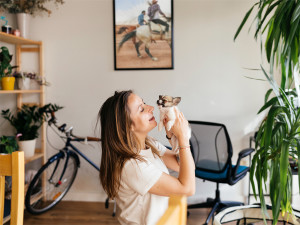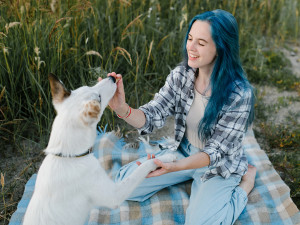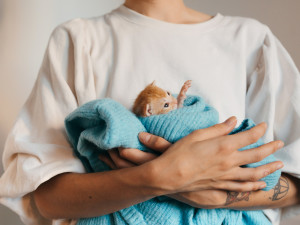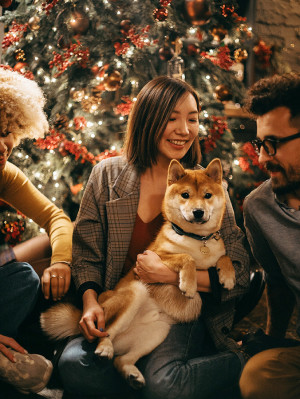Should You Give a Pet as a Gift? It Depends
Puppies and kittens are cute, but read this expert advice before attaching a bow to their collars and handing them to a pal.
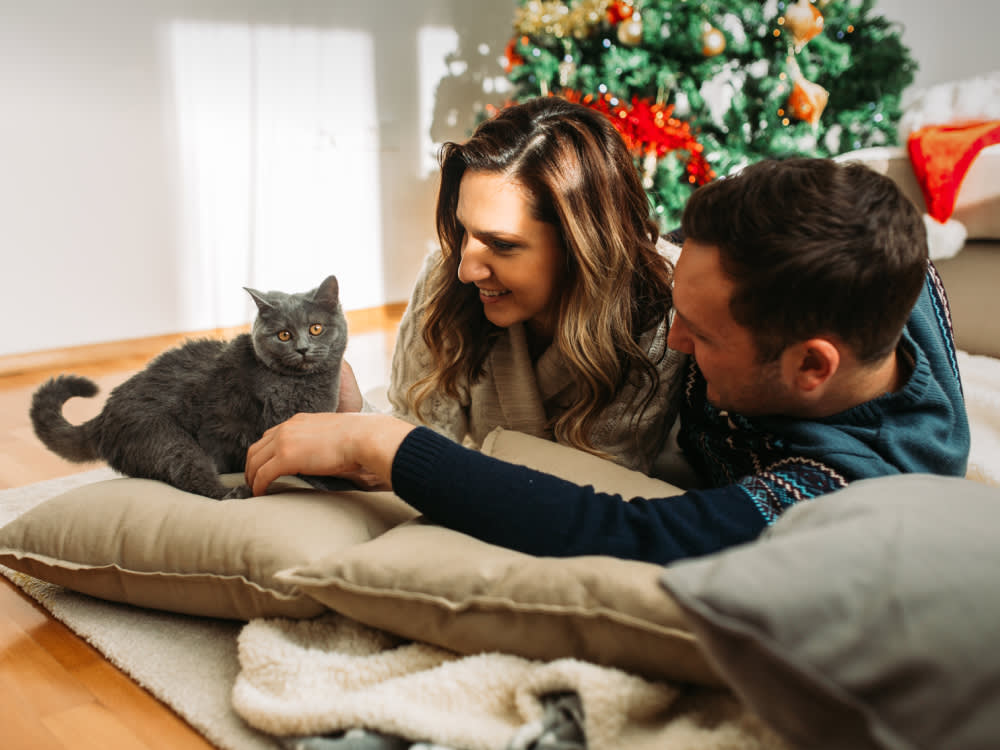
Share Article
Just like there is nothing cuter than a puppy or kitten with a red bow around their neck, there is almost nothing as controversial in the animal welfare world as whether people should give pets as gifts to partners, children, or loved ones. But one thing we can all agree on is that gifting an animal should be taken very seriously. Here are some tips if you’re thinking about it.
1. Consider alternatives to picking out the pet yourself.
At least half of the fun of adopting a new pet is picking one out, so consider getting a gift certificate at your local shelter or rescue to cover the cost of an adoption donation, then schedule a time to bring your partner or family in to meet the pet of their dreams. Or join the tens of thousands of caring people who open their homes to a foster pet in need each year, giving you an opportunity to see how a litter of kittens or puppies does in your home and letting your children decide who they’d like to keep. They don’t call it “pick of the litter” for nothing!
2. Is it the right time to gift a pet?
Maybe you’ve been in a relationship with your significant other for a while, and you’ve both talked extensively about adding a pet. You know intimately what kind of animal they want and the type of activities they want to do with your new companion, and you’re ready to have a conversation about who would keep the pet if the relationship were to end. If this is the case, talk to your local shelter about options. Some organizations will require everyone in the home to meet a pet before finalizing an adoption. Others are finding that when the gift-giver has received all the necessary counseling and will be part of the pet’s life too, pets given as gifts are no more likely to be returned to a shelter. (This is backed by research opens in new tab conducted by the ASPCA, too.)
3. Can you mitigate some of the extra stress common over the holidays?
I can still picture the day I came home from my grandmother’s after two weeks of summer vacation to find that my mother had adopted a new puppy from the shelter while we were away. Her reasoning was simply that my brother and I had been able to pick out our two cats, and she wanted a turn deciding on the dog we’d grow up with. I walked into our house, dropped my bag, and screamed at the top of my lungs, so full of excitement that my noise sent the puppy hiding under a chair. Harry Truman (the dog) eventually got used to our childhood chaos, but looking back, some preparation might have helped make that first introduction — and his first few days — a little less stressful. Set up a room in your home for the pet to acclimate, or spend time with your kids watching videos on how to appropriately (and safely) greet a new cat or dog.
4. Build a foundation for success.
If you want to give something to unwrap, fill a basket with a leash, collar, bowls, toys, treats, a gift certificate for a training class or vet care and a positive training book. After the holidays are over and life settles down, check out your local shelter and rescue groups, or do the research required to find a reputable breeder. Consider an adult rescue dog. Sure, puppies are totally cute and fun, but they’re also a lot of work. Many adult dogs are housebroken and have all sorts of good behavior skills up their furry sleeves. This is one situation in which the best surprise is no surprise at all.
5. Have a plan if it doesn’t work out.
Maybe you misunderstood your partner’s love of Mastiffs and find them less than impressed to have a giant, drooling dog in the apartment; maybe your new pet doesn’t get along with everyone in the home, or the senior cat you adopted for your aging parent is just too much for them to handle. Sometimes, even with the most thoughtful process and research, we don’t always know whether a pet will be a good match. Have you talked to the shelter about their return process? Would you consider holding on to the pet (if it’s safe to do so) and helping the shelter find a better match?
If you’ve gifted a senior dog or cat with a senior relative in your life, create a plan if they were to pass away or became too sick to care for them. If you’re gifting to your children and hoping they’ll do all the litter box scooping and dog walking, what’s your plan when that inevitably falls through? (I say this as a child who gave a 12-minute presentation on how often I would scoop the box if my mom would let me get a kitten and then immediately forgot all responsibilities once he arrived.)
When gifting a pet comes from a place of helping an animal in need and takes into consideration the new pet parent’s needs and lifestyle, it can be successful. But if you’re unsure, there’s nothing like opening a gift card from your significant other who pretended to hate cats all these years, giving you the green light to pick one out from your local shelter or rescue — with an added benefit that you can get the predictable, happy screaming out of your system before the pet arrives.

Lindsay Hamrick, CPDT-KA
Lindsay Hamrick lives in New Hampshire with her three dogs, chickens, and an assortment of rotating foster animals. She forces her elderly chihuahua, Grandma Baguette, on overnight backpacking trips, can diaper a lamb with one hand, and while she’s a long-time Certified Professional Dog Trainer, 66.7% of her dogs still won’t lay down when asked.
Related articles
![shelter kittens playing with a round blue plastic toy with balls]()
Shelter Pets Deserve Christmas Gifts, Too
Seriously, you can donate to shelters just by shopping!
![anonymous woman pampering and taking care about a small ginger kitten]()
6 Ways to Help Local Shelters Without Committing to Full-Time Pet Parenthood
Learn how you can be there for animals in need this National Pet Day.
![Dog standing in an animal shelter]()
“Should I Adopt an Adult Rescue Dog?”
Yes! Shelters are full of good, grown-up doggos. Here’s how to find the perfect match.
![Two women and a man in glasses sitting in front of a decorated and brightly lit Christmas tree while the central woman holds a Shiba Inu dog looking directing at the viewer]()
How 6 Orgs Find Joy and Help Adoptable Animals During the Holiday Season
The holiday season is not so jolly for a lot of pet rescues. Here’s how they help their animals — and their volunteers and staff members — this time of year.

